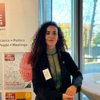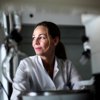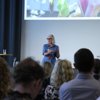Fritextsökning
Artiklar per år
Innehållstyper
-

MSD discontinues development of cancer drugs after trial failures
MSD suspends Phase 3 trials for two drug programs for different forms of cancer after trial failures.
-

MSD avbryter två cancerprojekt efter misslyckade studier
Merck & Co, eller MSD som det heter i Europa, avbryter fas 3-studierna för två läkemedelsprogram för olika former av cancer efter misslyckanden i studier.
-

“Research is always a lot of failures and a few successes”
Gene therapies open up fantastic possibilities, but they are also extremely expensive to produce. Genenova aims to change that and make the treatments accessible to more people. “Our overall ambition is to reduce costs a hundredfold”, says professor Johan Rockberg at KTH Royal Institute of Technology in Stockholm.
-

Medivir CEO on upcoming study: ”It's about working together with others”
Medivir is a small company with a big task: to take its drug candidate, via extensive clinical studies, all the way to a patient group that currently lacks approved treatment alternatives. "We can't do that on our own – our entire R&D activities are about working together with others," says the company's CEO Jens Lindberg.
-

The key to successful collaboration between industry and academia
Why is collaboration between industry and academia necessary in the life sciences sector? What obstacles exist, and what is the key to successful collaboration?
-

Roche’s Genentech terminates licencing deal with Norwegian biotech
Genentech is ending a license collaboration with Norwegian biotech Nykode Therapeutics regarding a clinical stage cancer vaccine program.
-

Her company is developing a new tablet form obesity drug
Obesity and diabetes are the primary targets of a new tablet treatment under development by Malmö-based Pila Pharma. The company’s ambition is to take on the billion-selling GLP1 analogues. ‘‘Basically, I expect all the beneficial effects that they have, but not the same side effect profile,’’ company founder Dorte X Gram said in an interview with Life Science Sweden.
-

From lab to patient – the art of developing new antibody therapies
For 25 years, Danish company Genmab has been developing antibodies and has managed to get several drugs all the way to the patient. Esther Breij has been along for much of the journey and has experienced setbacks, but also huge discoveries. “It’s amazing when you succeed,” she says.
-

“We should avoid surgery if we can”
Since February this year, she has been Scientific Director Life Science at the Karolinska Institutet. Life Science Sweden met Anna Martling for a talk about role models, surgery and Sweden’s strengths and weaknesses in medical research.
-

Takeover bid is being completed – Japanese company acquires Calliditas
Japanese company Asahi Kasei completes the bid for Calliditas Therapeutics after reaching over 90 percent of the shareholding. Callidita's board has now decided to apply for delisting of the company´s share from Nasdaq Stockholm.
-

Artificial intelligence in radiology – “Risk prediction is very exciting”
A growing number of solutions based on artificial intelligence are being developed and used in healthcare. According to Sophia Zackrisson, Professor of Radiology at Lund University, radiology is a field that is well suited to the technology.
-

EMA review confirms a risk of new cancer after CAR-T
CAR-T cancer therapies can, in rare cases, induce secondary cancers. The European Medicines Agency (EMA) now recognises this and requires a warning label to be attached to the product information and patients to be followed up for life.
-

IGN: Marknadsföring av prisvinnande läkemedel var vilseledande
Att framföra att ett läkemedel vunnit ett pris går att tolka som att det är bäst i sin klass, och kan därför vara vilseledande. Det slår Informationsgranskningsnämnden, IGN, fast i ett beslut.
-

Nobel Prize winner Torsten Wiesel turns 100: “Old men like me should use their experience to help the young”
In 1955, a young Torsten Wiesel jumped on a boat to the US and embarked on a fabulous career as a neuroscientist, crowned with a Nobel Prize for his work. Now 100 years old, he looks back on an intense life and his upbringing in Stockholm, Sweden, which shaped his desire to help the vulnerable in society.
-

Irlab värvar vd från Alzinova
Forskningsbolaget Irlab Therapeutics har rekryterat en ny vd. Den första augusti tillträder Kristina Torfgård på posten.
-

“Conducting research at universities is becoming more and more like working at a research hotel”
The government wants Swedish research to focus on excellence and innovation, but can the two be combined? Life Science Sweden talks to Anna Falk, a professor at Lund University, about research policy, the constant hunt for funding in academia and what constitutes ‘fine research’.
-

Total pipeline of pharmaceutical companies reaches a record high – 22,921 medicines are currently being developed
Despite the difficult economic times, pharmaceutical companies have never developed as many new drugs as now.
-

Carl Borrebaeck – professor and serial entrepreneur with a taste for speed
super exciting project in the pipeline,” he says.
-

Ancient DNA provides new insights – “The immune system lost its job”
Ancient bone remains from our ancestors have provided new insights into the prevalence of multiple sclerosis. By looking back in time, researchers can provide a possible explanation for why the disease is more prevalent in northern Europe.
-

KI’s freezer fiasco investigated: A chain of failures
A chain of combined technical and organisational shortcomings caused the freezer breakdown at the Karolinska Institute during the Christmas holidays, destroying more than 47,000 samples. This was the conclusion of an internal investigation.
-

Över 250 sajter stängdes efter försäljning av falska fetmaläkemedel
Över 250 webbsajter stoppades i fjol efter att ha marknadsfört förfalskade versioner av populära diabetes- och fetmaläkemedel av typen GLP-1-analoger.
-

Anna Törner: ”Orphan Designation – the "petite robe noire" of drug development”
It is easy to cling to various regulatory incentives, like orphan designation, and other expedited pathways, without understanding what they truly mean or whether they are indeed right (or wrong) for the current project, Anna Törner writes in a column.
-

Venom from the deathstalker carries radiopharmaceuticals to the brain
In order to target cancerous brain tumours with radionuclides, the problematic blood-brain barrier must first be crossed. Life Science Sweden has visited a KI researcher who is trialling an unusual approach ‒ using scorpion venom.
-

Samuel Lagercrantz: ”Will the Swedish life science strategy be updated with precision?”
What will the Swedish government focus on in the life science strategy that is being updated? And what should be prioritized in the strategy? Life Science Sweden's editor-in-chief Samuel Lagercrantz highlights three areas.